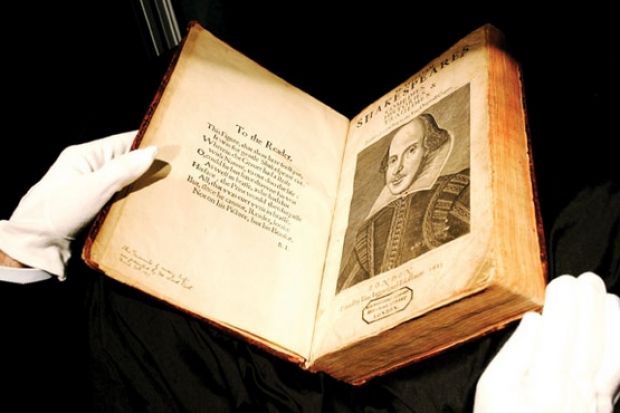Opposite Tokyo's elegant Imperial Gardens, hundreds of people waited in line to glimpse a British cultural icon. It was not a film star, a Premier League footballer or even Prime Minister David Cameron, whose visit to Japan the previous week went largely unnoticed.
The fans outside the British Embassy were present to see someone held in awe by all generations in Japan: William Shakespeare - or more precisely, a rare First Folio of his plays.
The £4 million document was in town last month thanks in large part to De Montfort University, which is using the folio to establish its credentials in Japan, create alliances with some of the country's most prestigious universities and recruit students.
The buzz surrounding the Shakespeare folio suggested that such canny cultural diplomacy was paying off more readily than meet-and-greets by vice-chancellors from universities with grander global reputations.
Hundreds of high school pupils attended workshops based on the literary treasure, while Dominic Shellard, De Montfort's vice-chancellor and a Shakespeare scholar, gave a public lecture on the Bard's life.
Yukio Hatayama, a former prime minister of Japan, Jonathan Choi, the Hong Kong billionaire and a number of Japanese university leaders also jetted in for a reception at the embassy, enthusiastically hosted by Sir David Warren, British ambassador to Japan, who gave a lively recital from Much Ado about Nothing to the assembled dignitaries.
The busy schedule of cultural events was made possible by Jamie Andrews, De Montfort governor and head of English and drama at the British Library, which arranged for the First Folio's trip abroad as part of wider efforts to promote the UK ahead of the London 2012 Olympics.
Bringing cultural treasures to Japan has helped to establish a meaningful two-way relationship between De Montfort and Japanese universities, explained Martyn Kendrick, De Montfort's director of international strategy and a member of the delegation to Japan.
"We are not so arrogant as to say we are coming here and taking [home] hundreds of students with us," he said. "But if we show we are here for the long haul, I think that is more effective than the [student recruitment] agency model in the long term. It has to be a win-win for both parties or it is not sustainable."
Student exchanges with Asian giants may be possible in the future as De Montfort is introducing a language option into the syllabus of many of its courses from 2013-14, Mr Kendrick added.
"Students will be able to study Mandarin and Japanese and earn 30 credits, so we are creating demand within the university for these exchanges," he said.
Simply connect
The charm offensive has been coordinated by Professor Shellard, who visited the country many times while pro vice-chancellor for external affairs at the University of Sheffield (which boasts one of the UK's best-known Japanese departments).
Using his considerable contacts, he has set up partnerships with the universities of Meisei, Hiroshima and Tohoku, which is close to the Sendai area devastated by the Japanese earthquake and tsunami in March 2011.
Last year, De Montfort students raised £40,000 to host 14 Tohoku undergraduates at their Leicester campus, and Professor Shellard was keen to meet the participants almost 12 months on.
"One architecture student said the confidence she gained from winning the trip abroad had changed her life," he said. "She had entered and won a national architecture competition, which will see a theatre that was washed away by the tsunami rebuilt."
Professor Shellard added: "One lad said his hobby was badminton, but that his confidence had been destroyed by the tsunami.
"His ambition was to go back to Sendai and do some badminton coaching. He has now set up a badminton coaching session because he thinks Japan needs to help rebuild people, not just buildings."
Knowing Japan's monarchist leanings, Professor Shellard was also keen to advertise the Queen's visit to De Montfort in March at the start of her Jubilee Tour - an honour that many Japanese university leaders find incredible.
While only about 4,000 Japanese students came to the UK in 2009-10 (compared with almost 57,000 Chinese students), Professor Shellard said that the market will expand as employers look for graduates confident enough to operate in foreign markets.
He said: "How can a company such as Mitsubishi understand the market in Rome, Paris or London if its staff don't visit these places?
"The UK sector cannot just assume that the same Chinese students will be coming over year after year. Australia is a big player, while German and Dutch universities are offering postgraduate courses in English.
"You have to maximise your exposure to international markets if you are serious about creating stability in the international market."
Register to continue
Why register?
- Registration is free and only takes a moment
- Once registered, you can read 3 articles a month
- Sign up for our newsletter
Subscribe
Or subscribe for unlimited access to:
- Unlimited access to news, views, insights & reviews
- Digital editions
- Digital access to THE’s university and college rankings analysis
Already registered or a current subscriber? Login
